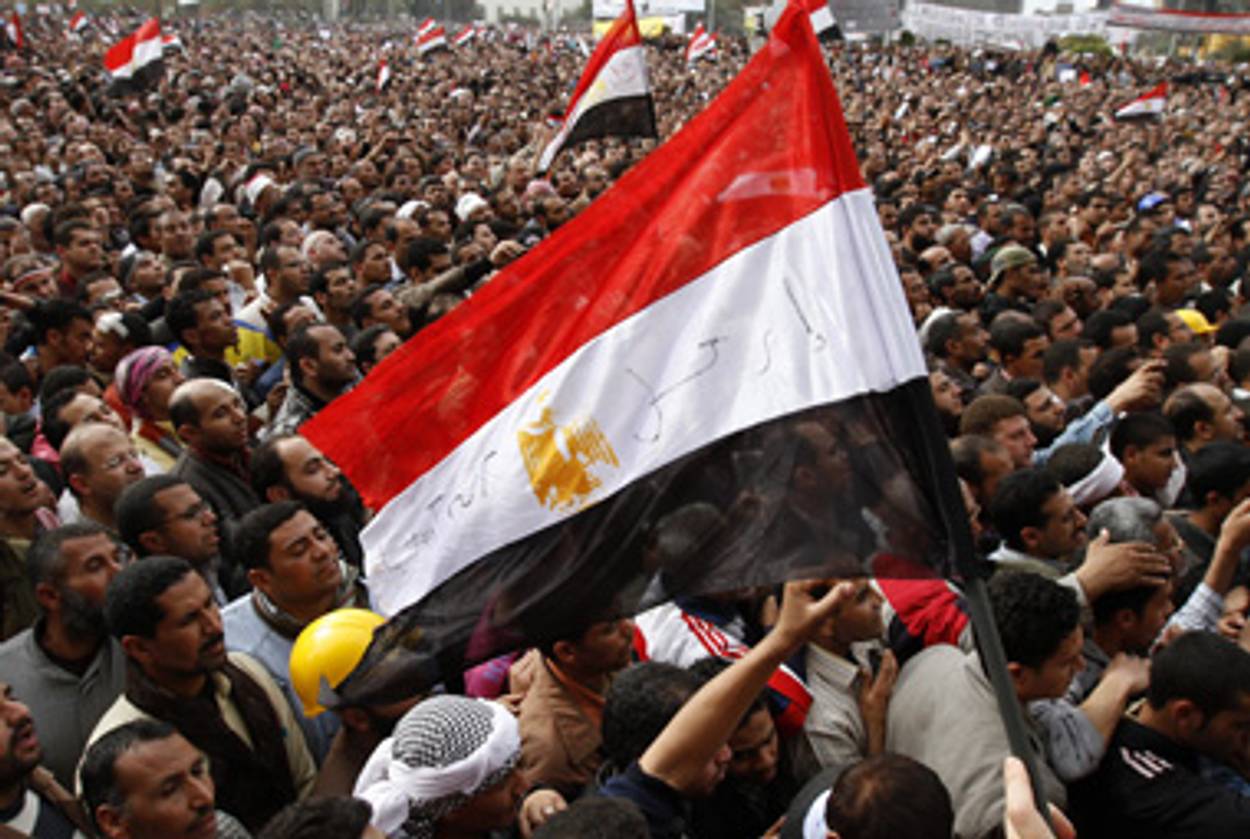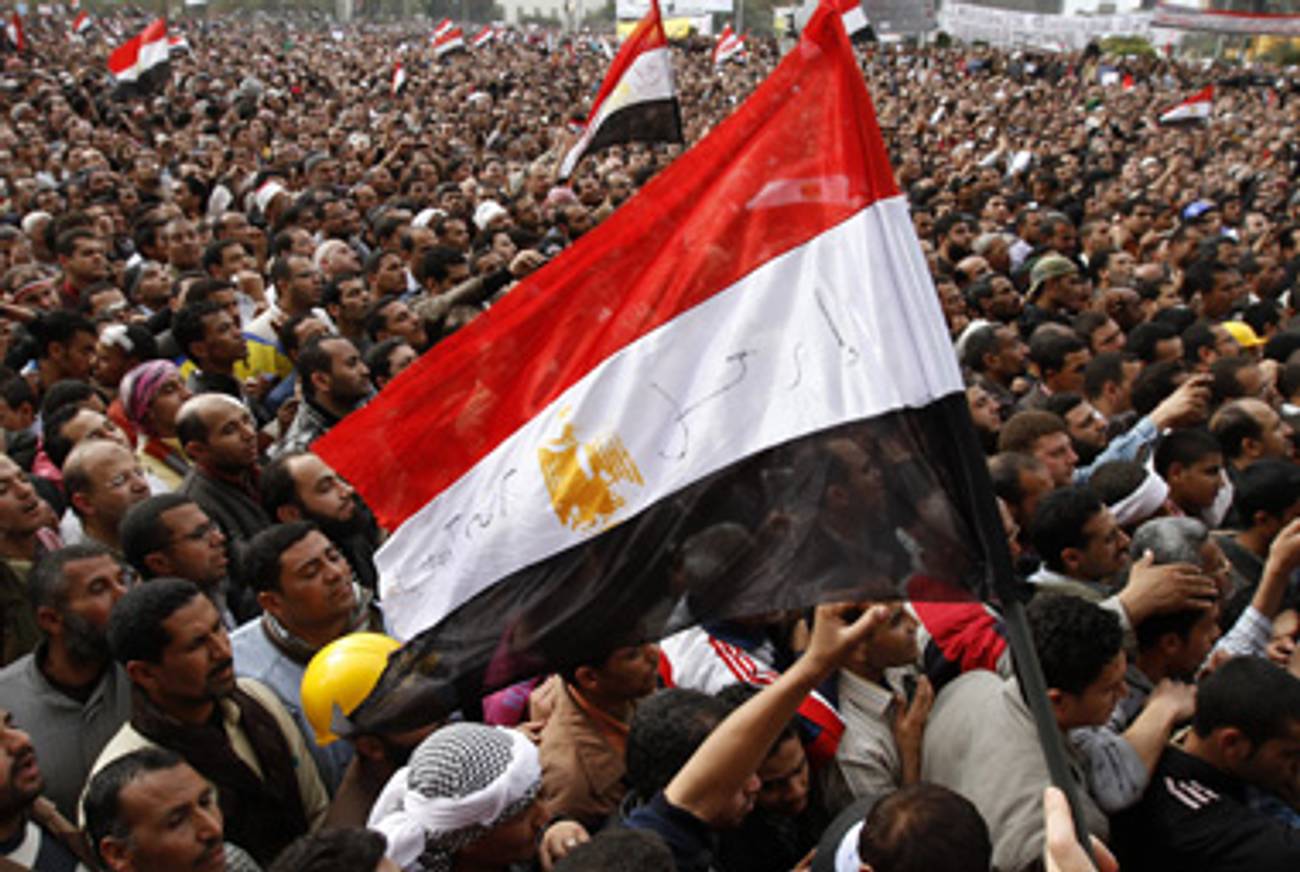Egypt on the Brink
Tablet Magazine’s coverage of the Egyptian uprising, including insights from Yossi Melman, Leslie Gelb, Judith Miller, Lee Smith, an Obama Mideast adviser, and a former Israeli ambassador to Egypt




Over the last 10 days, the Egyptian people have said “Kifaya!”—“Enough!” After days of mostly nonviolent protests, President Hosni Mubarak’s 30-year autocratic rule over Egypt—the country that’s a cornerstone of U.S. and Israeli Mideast policy—is poised to end. Tablet Magazine has been covering events as they unfold.
Monday, January 31: “Burning Bush,” by Lee Smith. The mass uprising in Egypt that seems set to overthrow the Mubarak regime is the latest test of George W. Bush’s Freedom Agenda. The U.S. and Israel are hoping it works out better than the previous three.
Tuesday, February 1: “Borderline,” by Yoav Fromer. There are several good reasons why Israelis are pulling for the Mubarak regime to hold onto power in Egypt. But maybe they should be embracing change there, instead.
Wednesday, February 2: “Desert Storm,” by Yossi Melman. Israeli leaders have long had only one concern when it comes to Egypt: stability, which Hosni Mubarak provided. That’s changing, no matter who ends up in charge.
Thursday, February 3: “Mubarak, Alone,” by Daniella Cheslow. While Israeli officials stay silent on Egypt, Eli Shaked, a former ambassador to Cairo, tells Tablet Magazine about the embattled president he once knew and respected.
Friday, February 4: “Crisis in Cairo,” by Marc Tracy. Mubarak is an autocrat, but he’s also a pro-Israel U.S. ally. As his regime teeters, Tablet turns to experts for perspectives on a rapidly shifting landscape:
• Judith Miller, the New York Times’ former Cairo bureau chief, on the prospects for a transition of power in Egypt.
• Brian Katulis, a senior fellow at the Center for American Progress, on the Obama administration’s response.
• Aaron David Miller, an experienced U.S. adviser on Mideast peace negotiations, on the immediate effect on the peace process of the events in Egypt.
• Bruce Riedel, a senior fellow in the Saban Center for Middle East Policy at the Brookings Institution, on security issues.
• James Hamilton, an economics professor at the University of California, San Diego, on oil.
• Leslie H. Gelb, the president emeritus of the Council on Foreign Relations, on Egypt’s next leader.
And more, including extensive coverage on The Scroll.
***
Previously, in Tablet:
Extreme Makeover by Lee Smith. Obama’s Middle East policy may soon shift away from moderates in favor of extremists.
Respectfully Yours by Lee Smith. Dalia Mogahed may be the most influential figure guiding the Obama Administration’s Middle East outreach.
Obama in the Mideast, Part 1 by Lee Smith. Elliott Abrams, Robert Malley, Dore Gold, and Andrew Exum consider the president’s policies in the region.
Obama in the Mideast, Part 2 by Lee Smith. Ramin Ahmadi, Lokman Slim, Martin Kramer, and Jacob Weisberg consider the president’s policies in the region.
Undersold by Sarah Mishkin. Courtroom troubles and money woes plague Cairo’s last Jews.
Family Feud by Sarah Mishkin. What an Egyptian thriller says about the country’s perception of Israel.
Cairene Dream by Jessie Graham. In telling her father’s story of exile, Lucette Lagnado conjures the beloved Egypt and ugly Brooklyn of her youth.
Purple Rose of Cairo by Michael Weiss. The trouble with conservative critiques of Obama’s Cairo speech.
From the editors of Tablet Magazine.